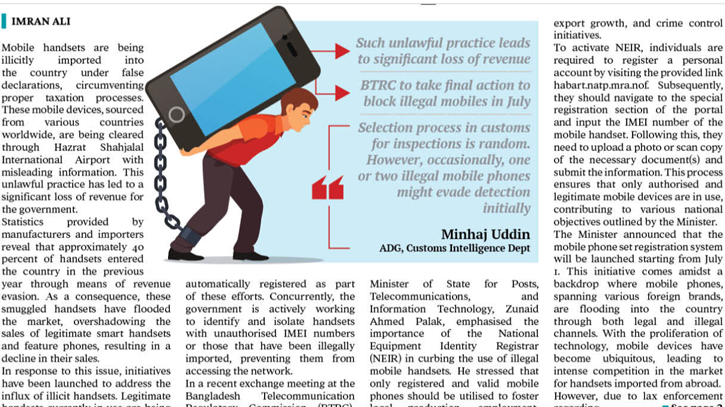
Photo : Messenger
Mobile handsets are being illicitly imported into the country under false declarations, circumventing proper taxation processes.
These mobile devices, sourced from various countries worldwide, are being cleared through Hazrat Shahjalal International Airport (HSIA) with misleading information. This unlawful practice has led to a significant loss of revenue for the government.
Statistics provided by manufacturers and importers reveal that approximately 40 percent of handsets entered the country in the previous year through means of revenue evasion. As a consequence, these smuggled handsets have flooded the market, overshadowing the sales of legitimate smart handsets and feature phones, resulting in a decline in their sales.
In response to this issue, initiatives have been launched to address the influx of illicit handsets. Legitimate handsets currently in use are being automatically registered as part of these efforts. Concurrently, the government is actively working to identify and isolate handsets with unauthorised IMEI numbers or those that have been illegally imported, preventing them from accessing the network.
In a recent exchange meeting at the Bangladesh Telecommunication Regulatory Commission (BTRC), Minister of State for Posts, Telecommunications, and Information Technology, Zunaid Ahmed Palak, emphasised the importance of the National Equipment Identity Registrar (NEIR) in curbing the use of illegal mobile handsets. He stressed that only registered and valid mobile phones should be utilised to foster local production, employment, export growth, and crime control initiatives.
To activate NEIR, individuals are required to register a personal account by visiting the provided link habart.natp.mra.nof. Subsequently, they should navigate to the special registration section of the portal and input the IMEI number of the mobile handset. Following this, they need to upload a photo or scan copy of the necessary document(s) and submit the information. This process ensures that only authorised and legitimate mobile devices are in use, contributing to various national objectives outlined by the Minister.
The Minister announced that the mobile phone set registration system will be launched starting from July 1. This initiative comes amidst a backdrop where mobile phones, spanning various foreign brands, are flooding into the country through both legal and illegal channels. With the proliferation of technology, mobile devices have become ubiquitous, leading to intense competition in the market for handsets imported from abroad.
However, due to lax enforcement regarding handset usage, unofficial devices are being sold at significantly lower prices compared to their official counterparts. For instance, while an official handset may be priced at Tk 26,000, its unofficial counterpart could be available for Tk 24,000. Consequently, consumers are increasingly gravitating towards unofficial handsets due to their relatively lower costs. This trend underscores the need for tighter regulation and enforcement within the mobile handset market to ensure fair competition and consumer protection. The introduction of the mobile phone set registration system aims to address these issues by promoting the use of legitimate devices and curbing the circulation of unauthorised handsets.
A member of the Bangladesh Mobile Phone Importers Association (BMPIA) revealed anonymously that sales of legitimate smart handsets experienced a significant decline in 2023, dropping by 29 percent compared to 2022. Similarly, sales of feature phones also saw a decline of over 20 percent during the same period. This decline can be attributed to the market dominance achieved by smugglers, who managed to capture a substantial share of the market, amounting to 30 lakh smartphones and 80 lakh feature phones within just a year.
Despite the efforts of official mobile phone importers of foreign brands, they are facing challenges in making substantial profits from bringing mobile handsets into the country through legitimate channels. Commercially, they are struggling due to relatively low sales volumes. This situation reflects the adverse impact of smuggling and the presence of unauthorised handsets in the market, which not only erodes the market share of legitimate importers but also affects their profitability. Currently, there are 17 domestic and foreign companies involved in handset manufacturing, highlighting the competitiveness of the market.
Mujibur Rahman, the owner of the sole importer of Xiaomi mobile phones, expressed frustration regarding the lack of government action on enacting a law to address the issue of illegal handsets. He stated that the Bangladesh Mobile Phone Importers Association (BMPIA) has been urging the government to implement such a law for five years, but their requests have gone unheeded.
Despite the appeals from industry stakeholders, the government has issued strict warnings against the use of illegal handsets. The Bangladesh Telecommunication Regulatory Commission (BTRC) announced the initiation of the National Equipment Identity Registrar (NEIR) operation on July 1st, as of September 30, 2021. However, despite the government's assurance that all illegal handsets newly connected to the network would be disconnected from October 1 of that year, no such action has been taken.
The introduction of the National Equipment Identity Registrar (NEIR) system has proven to be highly effective in curbing the entry of illegal mobile phones into the country, with the number of such devices decreasing to almost zero. This development has brought significant relief to mobile phone manufacturers in the country.
Prior to the implementation of the NEIR system, the extent of the gray market, consisting of mobile phones that entered the country illegally, accounted for more than half of the total mobile market, standing at 53 percent. However, with the introduction of this system, buyers are compelled to purchase mobile phones manufactured in the country and sourced through legitimate channels. Consequently, the gray market has experienced a drastic reduction, almost becoming non-existent.
Minhaj Uddin, the Additional Director General of the Customs Intelligence Department, informed The Daily Messenger that their selection process for inspections is random. However, he acknowledged that occasionally, one or two illegal mobile phones might evade detection initially. Nevertheless, he emphasised that they permit redemption after thorough verification.
He further stated that despite their efforts, there might still be instances where one or two illegal mobile phones manage to slip through the cracks. Hence, he stressed the importance of exercising greater caution and vigilance in their operations to prevent such occurrences.
Messenger/Fameema








